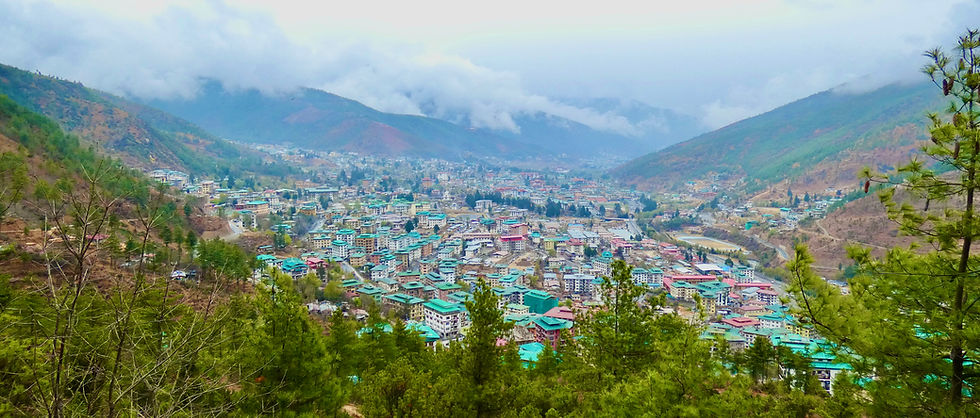Upcoming test for Bhutan's young democracy
- Jan Dehn

- Mar 21, 2023
- 3 min read
Updated: Apr 27, 2025

Thimphu, the capital of Bhutan (Source: own photo. All photos in this blog post are my own)
Update:
28 January 2024: It is all change as Bhutan’s liberal politician Tshering Tobgay, leader of the People’s Democratic Party (PDP), officially began his second term as prime minister on Sunday following elections earlier this month, where DPD won 30 seats (out of 47).
––––––
Bhutan’s next parliamentary election is scheduled for 20 April 2023. Elections are still a bit of a novelty in Bhutan, which only held its first fully democratic election in 2011 following a long period of absolute hereditary monarchy.
To put things in context, Bhutan only abolished slavery in 1958!
Bhutan’s Third King Jigme Dorji Wangchuck was the first monarch to introduce democratic reform, when he established a National Assembly in 1952.
His successor, the Fourth King Jigme Singye Wangchuck, oversaw further political and legal reforms, including the introduction of procedures for royal abdication and a draft democratic constitution. While Jigme Singye Wangchuck had a fine record on democratic reform he also expelled thousands ethnic Nepalese in the 1990s, perhaps because they would pose a threat to the traditional powerbrokers under representative government.
Democratic reform continued under the Fifth and current King H.M Jigme Khesar Namgyel Wangchuck, who was finally able to enact his father’s democratic constitution in 2008, paving the for the elections to both houses of Parliament and three levels of local government in 2011.
The current Bhutanese government maintains close ties with India, which is Bhutan’s most important trading partner by some distance. For example, India buys almost all of Bhutan’s exports of hydroelectric power, the country’s number one export.
On the other hand, Bhutan currently has no official ties with China. The government is trying to improve relations with its northerly neighbour, but every overture towards China is met with resistance from India. As one local told me in reference to his country’s struggles to manage relations with its huge neighbours to the North and South, “Bhutan is like a very small beef burger patty in a very large hamburger!”
Other than geopolitics, the main issues in the upcoming election revolve around Bhutan’s constant battle to balance forces of modernity and tradition. The current government wants to modernise and receives advice to this end from the government of Singapore. However, the conservative rural population in Bhutan, which comprises 80% of the population and still depends on agriculture, is uneasy about the rapid pace of change.
The incumbent government is also facing criticism for several serious policy mistakes from the professional classes in Thimphu and other bigger cities. In particular, a new tax on tourists – who have to pay USD 250 per person per day to visit Bhutan – has decimated the tourism industry. Granted, the tax is great if you are a one of the few tourists to come here, because you have all the sights for yourself, but coming hot on the heels of Covid-19 the tourism tax has been a complete disaster for tour guides, hotels, restaurants, and others, who make a living from showing foreigners this amazing country.
(Aside: Bhutan handled Covid amazingly well – only 21 people died with 62,637 infected out of a population of 777,000. This implies a death rate of 27 per million, which compares to 3,340 in the US, 3,043 in the UK, and 1,429 in Denmark).
The tension between modernity and tradition also manifests itself in a massive brain drain, especially among the young. Nearly 15% of Bhutan’s population currently resides out of the country, most of whom have left in search of better economic opportunities. Those who opt to leave argue that the government, despite its eagerness to reform, still imposes far too many rules on citizens and businesses. Moreover, it is not just the young leaving. In a front-page article from 18 March 2023, ‘Business Bhutan’, a financial newspaper, reported that a record-breaking 2,612 civil servants left the public sector in 2022. This followed a record-breaking exodus of 800 civil servants in the previous year.
As for the upcoming April election, the local gossip among Thimphu’s educated professionals is that the current government will fall. If so, expect Bhutan to slow the pace of reform, but maybe also find the time to redress some of the policy mistakes of the recent past. This may not be a bad thing. After all, a country as steeped in tradition as Bhutan does not change overnight, especially if the people has to have a say. And that is what democracy is all about.










The End




Comments